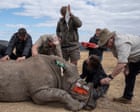
As our world faces the pressing challenges of climate change, diverse approaches are being undertaken across the globe, ranging from innovative conservation efforts to heated debates over energy policies. In this harmonious yet resolute look at current environmental efforts, we explore groundbreaking initiatives and the ongoing struggles that demand attention and action.
In South Africa, a revolutionary project aims to protect one of the world’s most endangered species. The Rhisotope Project, initiated by the University of the Witwatersrand along with nuclear energy experts and conservationists, provides a novel approach to combating rhino poaching. By injecting harmless radioactive isotopes into rhino horns, the project makes them detectable at customs checks, foiling traffickers. Early steps have seen five rhinos benefit from this initiative, marking a hopeful beginning for a more extensive rollout aimed at preserving the steadily declining rhino population. This innovative solution underscores humanity’s commitment to leveraging technology for wildlife conservation.
In stark contrast, northern China finds itself grappling with the consequences of extreme weather. Recent torrential rains have led to devastating floods in Beijing and its surrounding areas, with rainfall far exceeding normal levels. The suburban district of Miyun experienced the heaviest downpour, equivalent to an entire year’s worth of rain in just six days. Tragically, these floods have resulted in the loss of numerous lives, including 31 victims at a care home in Miyun and additional casualties from a landslide in Chengde. This somber narrative highlights the urgent need for effective disaster preparedness and climate resilience strategies in response to increasingly frequent extreme weather events.
Meanwhile, in Australia, the debate on energy policies takes center stage, reflecting a broader global discourse on the transition from fossil fuels to renewable sources. Led by figures like Barnaby Joyce, some political factions are advocating for a resurgence of coal-fired power plants, coupled with investments in gas and nuclear energy. They argue against cutting carbon emissions entirely, citing potential economic burdens on households. This divisive stance underscores the complex interplay between environmental responsibilities and economic considerations, urging a balanced approach that addresses both sustainability and economic growth.
The complexities of environmental challenges also extend to fiscal policies, as illustrated by the case of Adani’s Carmichael mine in Australia. Despite generating significant revenue amid the commodity price boom, the mine has reportedly not contributed to corporate tax, raising questions about fiscal governance and policy effectiveness. This scenario serves as a cautionary tale of the importance of transparent and accountable fiscal practices in fostering sustainable economic development.
In Portugal, the recurring wildfires evoke a deeper reflection on the balance between emergency response and preventive measures. As fires wreak havoc across the country each summer, there are calls for enhanced policies focusing on forest management and climate adaptation. These fires stand as poignant reminders of the continuous effort needed in both policy implementation and collective societal action to protect ecosystems and prevent future catastrophes.
Simultaneously, the discourse on the moral and legal responsibilities towards animals affected by such disasters amplifies the call for thoughtful consideration and proactive measures. The plight of wildlife caught in the flames of forest fires prompts a re-evaluation of the societal contract with nature and the ethical imperatives guiding our interactions with the animal kingdom.
In weaving these narratives together, we are reminded of the multifaceted nature of environmental challenges and the diverse approaches required to address them. From innovative technological solutions to policy debates and ethical reflections, the path towards a sustainable future is complex yet intimate—a collective journey where each step matters, nurturing hope and resilience in the face of adversity. The stories of today are the building blocks of tomorrow’s green legacy, urging us to act mindfully and harmoniously with nature.
Source: {link}
